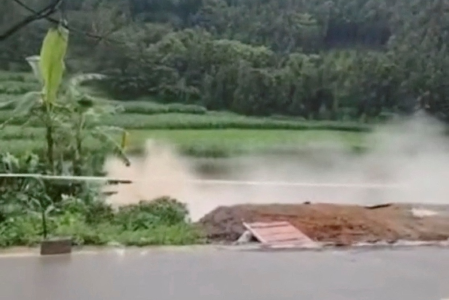More than two dozen people are missing after heavy rainfall in the Tibet region of China triggered a deluge in the Bhote Koshi River, which flows through Nepal and China, and washed away the “Friendship Bridge” that connects them, officials said on Tuesday.
At least 18 people are missing in Nepal while China’s Xinhua news agency said 11 people were missing on the Chinese side.
In Nepal, the missing include six Chinese workers and three policemen, the National Disaster Risk Reduction and Management Authority said on X, adding that eight electric cars were also washed away and a small hydroelectric plant damaged in the flood.
The missing Chinese were working at the inland container depot being constructed with Chinese assistance about 80km north of the capital Kathmandu, said Arjun Paudel, a senior administrative official of Rasuwa district.
“The river also swept away some containers with goods imported from China. There is a big loss [of property] and we are collecting details,” he told Reuters.
The Nepal army has rescued 11 people and search and rescue operations are still under way, spokesperson Raja Ram Basnet said.
China has been increasing its investment in Nepal in recent years in domains including roads, power plants and hospitals. The Asian giant has been battered by heavy rain and flash floods over the past few days, which have left a trail of destruction, and is bracing for a tropical storm this week.
In Pakistan at least 79 people, including 38 children, have died in floods and rain-related incidents, including landslides and house collapses, since June 26, its National Disaster Management Authority (NDMA) said on Tuesday.
The authority has issued fresh alerts for flash flooding and glacial lake outbursts in the northern and northwestern provinces of Gilgit-Baltistan and Khyber Pakhtunkhwa, citing “a significant rise in temperatures and an upcoming weather system”.
Gilgit-Baltistan’s northern Chilas district recorded the highest temperature in Pakistan on Saturday at 48.5ºC, breaking its earlier record of 47.7ºC reported in July 1997, said NDMA spokesperson Sophia Siddiqui.
Reuters
